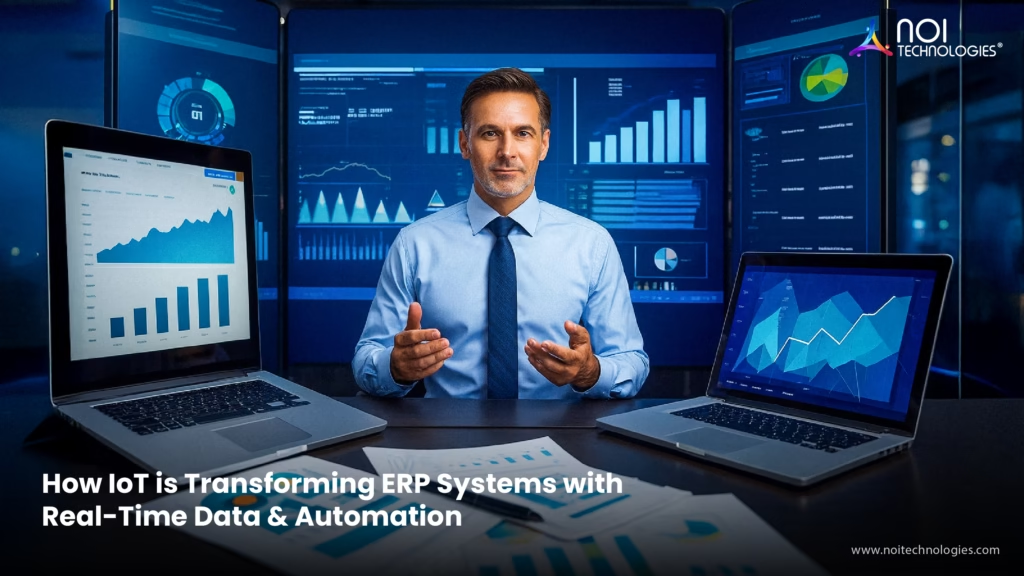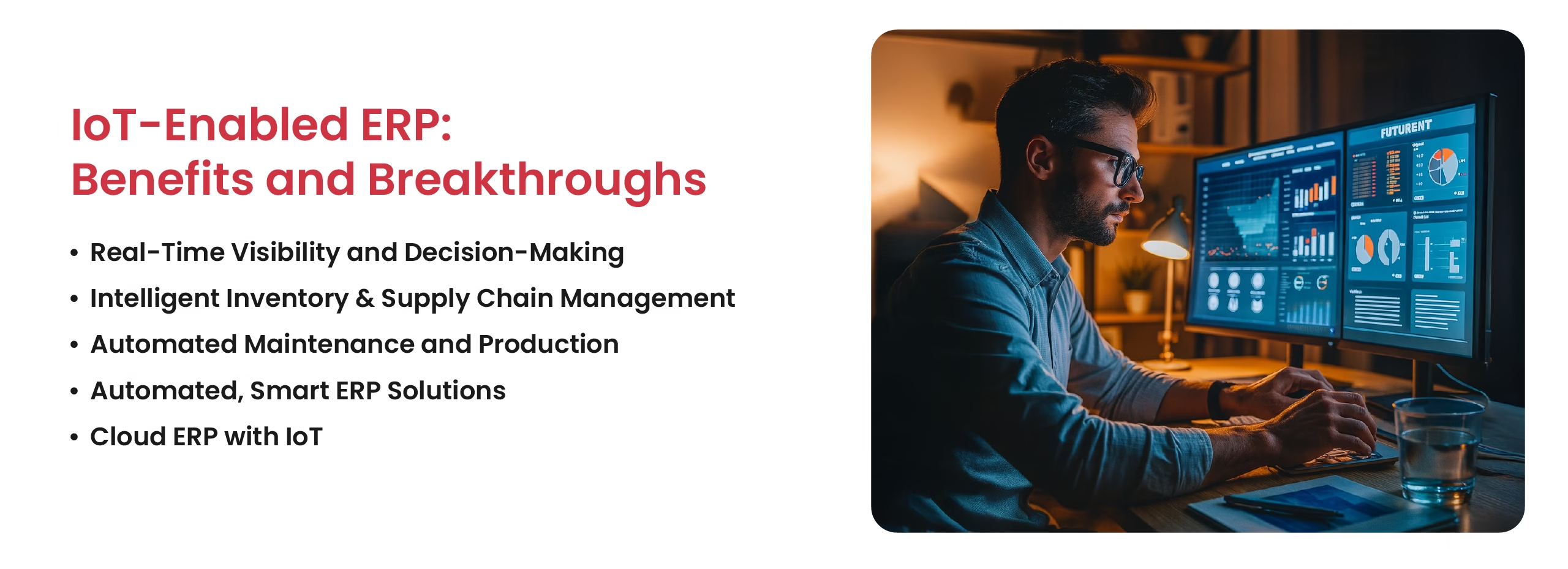
How IoT in ERP Systems is Transforming Business with Real-Time Data & Automation
How IoT in ERP Systems is Transforming Business with Real-Time Data & Automation https://www.noitechnologies.com/wp-content/uploads/IoT-in-ERP-Systems.avif 2560 1441 Visvendra Singh https://secure.gravatar.com/avatar/824969161f6ef5f9816028e493f8b0c199f12b9bdf61433328e6dada610d186b?s=96&r=gThe world of business is about to take a tremendous shift. With over 30 billion IoT-connected devices (Internet of Things) expected by 2025, companies are shifting from relying on delayed reports to running on real-time data from machines, warehouses, trucks, and customer interactions. This IoT-enabled transformation provides greater visibility across departments, maintains accurate inventory, and supports informed decision-making. This shift is driving demand for smart ERP solutions powered by IoT, creating a new era of connected ERP systems that rely on real-time data instead of delayed reports.
With 10 years of experience in open-source ERP, AI automation, and data-driven platforms, we help organizations get the full potential of ERP and IoT integration. In this blog, we will discuss how IoT-powered ERP systems are revolutionizing business processes with real-time intelligence, automation, and smarter decisions, and how NOI Technologies is driving this transformation.
What is IoT in ERP Systems?
Enterprise Resource Planning, abbreviated as ERP systems, connect and automate end-to-end business processes, from finance and HR to inventory, supply chain, and CRM, all within a single digital roof. On the other hand, the Internet of Things or IoT integrates the physical devices (like sensors, machinery, vehicles, or other assets) with the internet and empowers them to exchange real-time data.
IoT in an ERP system is all about how you connect these devices to your software platform. The goal of these solutions is to connect the physical and digital worlds. Before, ERP solutions relied on manual entries and reporting data lag. But with the integration of ERP and IoT, it’s possible to connect ERP to sensors, smart devices, and machines with little or no human interaction, leading to smart ERP solutions.
Top Benefits of IoT-Enabled ERP Systems

We’ve all faced challenges with our outdated ERP systems, such as disconnected systems, dropped alerts, stockouts, manual reporting, and shutdowns. Now, let’s have a look at how IoT-enabled ERP software solves these challenges:
1. Real-Time Visibility and Decision-Making
Just imagine owning a business in which you get to have 24/7 updates of what’s exactly happening. This is the indispensable power of IoT-driven ERP solutions, serving you up a live portal into your operations. Now, you won’t have to gauge your performance based on old reports or wish that manual entries were correct.
With sensors enabling real-time data, you can track shipments, equipment, and inventory from anywhere and on any device. This means you can react immediately to a delay, restock before you are out, and smooth out peak hours to keep a smile on the face of your customers. This constant stream of insights gives you more than just the ability to make smarter decisions; it gives you the power that eliminates guessing or hoping. With real-time visibility, your teams are in sync, always one step ahead, and turning insights into action faster before the minor issues become major ones.
2. Intelligent Inventory & Supply Chain Management
Inventory and supply chain management is always a bit of a headache, with stock levels, shipments, and logistics a lot to juggle. Thanks to the IoT in your ERP, you’ve got a 24/7 partner: everything from product to vehicle, in the warehouse, is tracked in real-time. Every moment is monitored by RFID tags and smart sensors, and instantly updates the system. ERP can also automatically initiate a reorder when the stock level falls to a predetermined threshold, eliminating guesswork.
On the supply chain side, IoT sensors monitor shipments in transit, guaranteeing end-to-end visibility from the factory to the customer. Due to these intelligent ERP solutions, supply chain managers now have clarity and control over bottlenecks before they become a problem.
3. Predictive Maintenance and Production
In production, a single breakdown could lead to a number of delays, lost money, and missed deadlines. Prior, fixes occur after something has broken, which is expensive and inconvenient. However, by integrating IoT devices with ERP systems, factories could turn that reactive model into a more predictive one. Sensors affixed to machines monitor heat, vibration, and performance, and feed that data into ERP.
Using predictive analytics, ERP can detect warning signals and coordinate maintenance before a failure ever develops. Meanwhile, live monitoring verifies production quality, while IoT wearables provide a means to protect workers by signaling the team when conditions turn unsafe. This forward-thinking approach ensures smooth-sailing production lines, reduces costs, and enhances safety standards in any environment, making it a hands-down game-changer for manufacturing in the 21st century.
4. Smart Automation, Smart ERP Solutions
Time-consuming, menial tasks can be resource-intensive and prone to error in the enterprise. Cutting-edge smart ERP powered by IoT levels up by automating the basics and freeing your people for meaningful work: growth and innovation. Sensors and devices capture energy use, storage conditions, and order fulfillment, and deliver actionable alerts to your ERP dashboard.
Automation workflows minimize mistakes, improve productivity, and contribute to saving resources. Think about getting a notification when warehouse temperatures go wrong or having customer orders processed in real time. All your workflows are digitized and streamlined, allowing your business to grow automatically.
5. Cloud ERP with IoT Scalability
Modern businesses aren’t localized in a single office or factory; they cross the boundaries of regions, countries, and continents. That’s why cloud ERP with integrated IoT is increasingly becoming so important. With ERP being hosted in the cloud and fed with IoT data, businesses can now conduct operations from wherever and whenever. Now picture being able to remotely monitor warehouses in several cities or track delivery fleets in real time, all from a mobile dashboard.
With cloud ERP, you can scale up your system as you scale up your business, without expensive infrastructure. Additionally, with built-in analytics and AI, all that IoT data becomes actionable insights, enabling leaders to predict demand, optimize resource allocation, and respond to market shifts faster than they ever could before.
Ready to Explore IoT in ERP Systems?
Book a free consultation with our ERP experts and see how IoT-enabled ERP can
reduce downtime, optimize resources, and future-proof your operations.
Case Study: IoT-ERP Integration in Manufacturing
A mid-sized manufacturing company worked with NOI Technologies to connect IoT sensors to their ERP system. With our experience, the company gained real-time information on machine health and material consumption around the assembly line. Within just 3 months, their downtime was reduced by a staggering 40%, as machines communicated proactively with the ERP to schedule maintenance before any failures occurred. Furthermore, production efficiency has increased by 25%, and inventory wastage has been reduced since real-time stock tracking led to applied automatic order adjustments driven by live IoT data. Furthermore, production efficiency increased 25%, and inventory waste was significantly reduced with automated live IoT-driven data.
This shift wasn’t reserved for the giants like Tesla or Amazon; NOI Technologies demonstrated how businesses of all sizes can experience more efficient operations, increased profits, and less stress through intelligent ERP and IoT integration.
The Future of IoT-Enabled ERP Systems
The integration of ERP and IoT is no longer a futuristic dream; it’s already fundamentally redefining companies. Whether it’s predictive maintenance for manufacturing or real-time tracking of supply chain or smart inventory management, or cloud-based scalability, the benefits are obvious and revolutionary. The future of ERP IoT integration will combine AI, machine learning, and 5G to deliver predictive, self-optimizing operations.
NOI Technologies focuses on unlocking the potential of IoT-integrated ERPs to deliver increased efficiency, reduced costs, and increased productivity for clients. Having profound knowledge and experience in open-source ERP systems and innovative IOT solutions, we are currently serving 50+ clients globally, including Nogin E-commerce, Vinci School, Fulfillment Plus, Interbrand, FNP, and many more
To take the complete advantage of IoT-driven ERP, get in touch with our ERP architects and schedule a one-on-one ERP consultation. Create a smarter, connected, and future-proof ERP solution for your business with us!
Let’s Build Your IoT-Enabled ERP Solution
Whether you’re a growing SMB or a large enterprise, our team at NOI Technologies is here to help.
Get in touch today and discover how IoT-integrated ERP can transform your business operations.
IoT in ERP Systems: Frequently Asked Questions
1. How does IoT integrate with ERP systems (ERP IoT integration)?
IoT connects physical sensors and devices (such as machines) to ERP by gathering real-time data. This removes the lag of manual reporting and enables organizations to act proactively.
2. What advantages does IoT-enabled ERP offer to manufacturing businesses?
Predictive maintenance, improved product quality, fewer equipment failures, and better resource utilization—leading to smoother production and higher profitability.
3. What is the use of IoT in ERP for supply chain management and connected ERP solutions?
Real-time shipment visibility, condition monitoring, reduced spoilage, and automated reorders—minimizing delays and bottlenecks across the supply chain.
4. Can Small and Medium Businesses Benefit from IoT and ERP Integration?
Absolutely. One SMB reduced downtime by 40% and costs by 25% using IoT-embedded ERP. These solutions are scalable, cost-effective, and not just for large enterprises.
